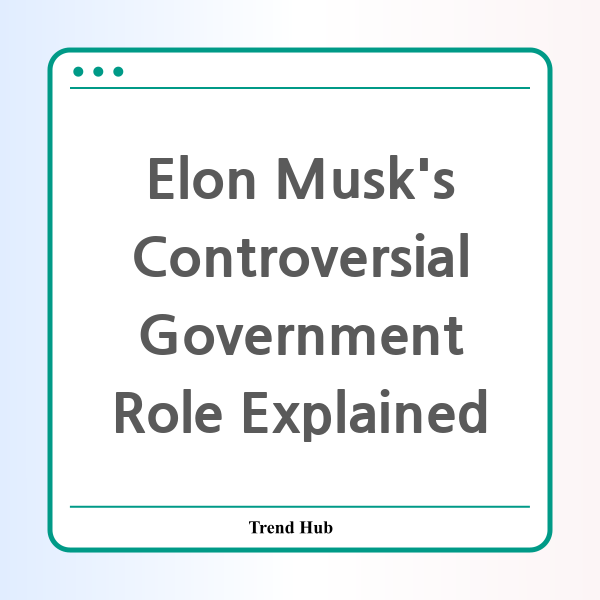* This website participates in the Amazon Affiliate Program and earns from qualifying purchases.

What happens when a tech mogul steps into the realm of government efficiency? The recent legal battles surrounding Elon Musk and his Department of Government Efficiency (DOGE) shine a light on this intriguing intersection of technology, law, and governance.
In a recent ruling, a federal judge dismissed a request from a coalition of Democratic state attorneys general aimed at blocking Musk and DOGE from accessing vital federal data systems across multiple agencies, including the Departments of Education, Labor, and Health and Human Services. This decision is significant as it reflects both the ongoing legal complexities and the substantial implications of Musk's involvement in reshaping the federal bureaucracy.
The attorneys general argued that Musk’s role violates the Constitution’s Appointments Clause. This clause mandates that individuals who wield significant authority in governance must be formally appointed by the President and confirmed by the Senate. Musk, however, was not nominated nor confirmed, which raises serious questions about his authority and the legitimacy of DOGE's operations.
Judge Chutkan, who delivered the ruling from the federal district court in Washington, D.C., acknowledged the potential constitutional violations but ultimately stated that the attorneys general had not demonstrated the imminent, irreparable harm required to warrant a temporary restraining order. Her ruling pointed out that while the states presented a "colorable Appointments Clause claim with serious implications," it was not sufficient to secure emergency court intervention.
Chutkan's critique of the inconsistency in claims regarding Musk's powers illustrates the complexities of this case. She highlighted contradictions between the Trump administration's assertions about Musk's authority and the executive orders that established DOGE. The judge emphasized the importance of truthful representations in court, further complicating Musk’s position in this legal landscape.
While the legal battle continues, the implications for federal governance are profound. The attorneys general expressed concerns that Musk’s access to sensitive federal data could lead to severe repercussions for their states, particularly regarding the management of federal agencies that provide essential services to citizens. They argued that without a restraining order, the ongoing restructuring and potential disclosure of sensitive information could result in irreparable harm.
The implications of Musk's endeavors extend beyond just legal and constitutional realms; they delve into the operational fabric of federal agencies themselves. The states called for maintaining the "status quo" prior to the establishment of DOGE, which they argued would ensure a functional federal government. Their legal push is indicative of broader fears surrounding the privatization of government functions and the impact that such changes could have on critical state services.
This case not only raises questions about the legality of Musk’s role but also the future of how government functions could be influenced by private-sector methodologies and leadership. As federal court decisions unfold, we must consider the broader implications of merging tech-driven innovation with traditional government operations.
In conclusion, Elon Musk’s role in DOGE is emblematic of the evolving relationship between technology and governance. The legal challenges he faces highlight the complexities of modern leadership and the intricate balance needed to maintain democratic integrity while embracing innovation. As we watch this story develop, it offers a critical perspective on how the private sector might shape the future of public administration.
* This website participates in the Amazon Affiliate Program and earns from qualifying purchases.